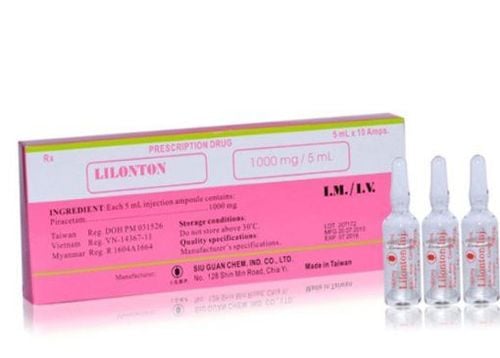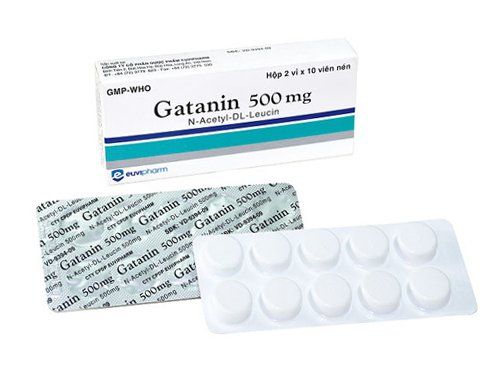This is an automatically translated article.
Pietram belongs to the group of psychotropic drugs, prepared in the form of an injectable solution, packaged in a box of 5 ampoules x 10ml of injection solution. Before using Pietram, patients should consult a pharmacist or specialist to use the drug safely and effectively.
1. Ingredients of Pietram
Pietram medicine contains the main active ingredient Piracetam 2g and excipients with just enough drug content. Piracetam is a stimulant drug that is used to improve the metabolism of nerve cells.
Piracetam is a cyclic derivative of gamma aminobutyric acid and GABA, acting on a number of neurotransmitters such as Acetylcholine, Noradrenalin and Dopamine... Piracetam can alter a neurotransmitter and improve the environment. metabolism to support nerve cells to function properly.
Experimentally, Piracetam is effective against ischemic metabolic disorders, increasing glucose mobilization and utilization independent of oxygen supply, thereby facilitating the pentose and pentose pathways. maintain energy synthesis in the brain. Piracetam also works to increase dopamine release and memory formation. Piracetam has no sedating, sedative, resuscitative and analgesic effects. Piracetam can reduce the ability of platelets to agglomerate, in the case of abnormally stiff red blood cells, the drug also helps red blood cells recover their deformability and pass through capillaries more easily. Piracetam is also effective against muscle tremors.
2. Indications for taking Pietram
Pietram is indicated in the treatment of the following medical conditions:
Cognitive impairment; Chronic sensory neuropathy in the elderly; Cerebral ischemic sequelae; Symptoms of dizziness ; Traumatic brain injury and sequelae; Learning difficulties in children; Chronic alcoholism; Muscle tremors.
3. Dosage - How to take Pietram
Reference dose of Pietram:
Inject dose 30 - 160mg/kg/day, divided into 2, 3, 4 times. Severe cases: Dose 12g/day, IV infusion. Note: The above dose of Pietram is for reference only. The specific dose of Pietram depends on the condition and the progression of the disease. To get the right dose of Pietram, patients should consult their doctor or healthcare professional.
4. Contraindications to the use of Pietram
Pietram is contraindicated in the following cases:
Patients with hypersensitivity to the active ingredient Piracetam and derivatives. Brain hemorrhage . Patients with severe renal impairment, with creatinine clearance less than 20ml/min. People with Huntington's disease. Patients with liver failure. Contraindications are absolute. This means that for no other reason the contraindications are flexible enough to take Pietram .
5. Drug interactions
Drugs that stimulate the central nervous system. Neurotropic drugs. Thyroid hormone. To avoid drug interactions, before being prescribed Pietram, the patient should inform the doctor about the drugs they are using, including functional foods, herbs, vitamin supplements.... Doctor will base on that to prescribe the appropriate Pietram.
6. Side effects of Pietram
Besides the therapeutic use, Pietram can cause some of the following side effects for the patient:
Restlessness, restlessness; Stimulate; Concerned; Sleep disorders ; Tired; Digestive disorders. When experiencing side effects of Pietram, the patient should stop using it and notify the doctor or ask a loved one to take him to the nearest medical facility for timely treatment.
7. Be careful when taking Pietram
Pietram should be used with caution in the following subjects:
Elderly people; Epilepsy; Adjust dose of Pietram in patients with renal impairment. Above is all information about Pietram drug, patients need to carefully read the instructions for use, consult a doctor / pharmacist before using. Note, Pietram is a prescription drug, patients need to use the drug as prescribed by the doctor, absolutely do not self-treat at home.













